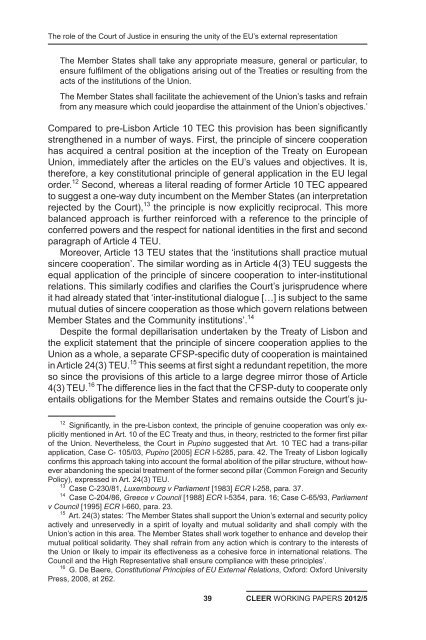Principles and practices of EU external representation - TMC Asser ...
Principles and practices of EU external representation - TMC Asser ...
Principles and practices of EU external representation - TMC Asser ...
Create successful ePaper yourself
Turn your PDF publications into a flip-book with our unique Google optimized e-Paper software.
The role <strong>of</strong> the Court <strong>of</strong> Justice in ensuring the unity <strong>of</strong> the <strong>EU</strong>’s <strong>external</strong> <strong>representation</strong><br />
The Member States shall take any appropriate measure, general or particular, to<br />
ensure fulfilment <strong>of</strong> the obligations arising out <strong>of</strong> the Treaties or resulting from the<br />
acts <strong>of</strong> the institutions <strong>of</strong> the Union.<br />
The Member States shall facilitate the achievement <strong>of</strong> the Union’s tasks <strong>and</strong> refrain<br />
from any measure which could jeopardise the attainment <strong>of</strong> the Union’s objectives.’<br />
Compared to pre-Lisbon Article 10 TEC this provision has been significantly<br />
strengthened in a number <strong>of</strong> ways. First, the principle <strong>of</strong> sincere cooperation<br />
has acquired a central position at the inception <strong>of</strong> the Treaty on European<br />
Union, immediately after the articles on the <strong>EU</strong>’s values <strong>and</strong> objectives. It is,<br />
therefore, a key constitutional principle <strong>of</strong> general application in the <strong>EU</strong> legal<br />
order. 12 Second, whereas a literal reading <strong>of</strong> former Article 10 TEC appeared<br />
to suggest a one-way duty incumbent on the Member States (an interpretation<br />
rejected by the Court), 13 the principle is now explicitly reciprocal. This more<br />
balanced approach is further reinforced with a reference to the principle <strong>of</strong><br />
conferred powers <strong>and</strong> the respect for national identities in the first <strong>and</strong> second<br />
paragraph <strong>of</strong> Article 4 T<strong>EU</strong>.<br />
Moreover, Article 13 T<strong>EU</strong> states that the ‘institutions shall practice mutual<br />
sincere cooperation’. The similar wording as in Article 4(3) T<strong>EU</strong> suggests the<br />
equal application <strong>of</strong> the principle <strong>of</strong> sincere cooperation to inter-institutional<br />
relations. This similarly codifies <strong>and</strong> clarifies the Court’s jurisprudence where<br />
it had already stated that ‘inter-institutional dialogue […] is subject to the same<br />
mutual duties <strong>of</strong> sincere cooperation as those which govern relations between<br />
Member States <strong>and</strong> the Community institutions’. 14<br />
Despite the formal depillarisation undertaken by the Treaty <strong>of</strong> Lisbon <strong>and</strong><br />
the explicit statement that the principle <strong>of</strong> sincere cooperation applies to the<br />
Union as a whole, a separate CFSP-specific duty <strong>of</strong> cooperation is maintained<br />
in Article 24(3) T<strong>EU</strong>. 15 This seems at first sight a redundant repetition, the more<br />
so since the provisions <strong>of</strong> this article to a large degree mirror those <strong>of</strong> Article<br />
4(3) T<strong>EU</strong>. 16 The difference lies in the fact that the CFSP-duty to cooperate only<br />
entails obligations for the Member States <strong>and</strong> remains outside the Court’s ju-<br />
12 Significantly, in the pre-Lisbon context, the principle <strong>of</strong> genuine cooperation was only explicitly<br />
mentioned in Art. 10 <strong>of</strong> the EC Treaty <strong>and</strong> thus, in theory, restricted to the former first pillar<br />
<strong>of</strong> the Union. Nevertheless, the Court in Pupino suggested that Art. 10 TEC had a trans-pillar<br />
application, Case C- 105/03, Pupino [2005] ECR I-5285, para. 42. The Treaty <strong>of</strong> Lisbon logically<br />
confirms this approach taking into account the formal abolition <strong>of</strong> the pillar structure, without however<br />
ab<strong>and</strong>oning the special treatment <strong>of</strong> the former second pillar (Common Foreign <strong>and</strong> Security<br />
Policy), expressed in Art. 24(3) T<strong>EU</strong>.<br />
13 Case C-230/81, Luxembourg v Parliament [1983] ECR I-258, para. 37.<br />
14 Case C-204/86, Greece v Council [1988] ECR I-5354, para. 16; Case C-65/93, Parliament<br />
v Council [1995] ECR I-660, para. 23.<br />
15 Art. 24(3) states: ‘The Member States shall support the Union’s <strong>external</strong> <strong>and</strong> security policy<br />
actively <strong>and</strong> unreservedly in a spirit <strong>of</strong> loyalty <strong>and</strong> mutual solidarity <strong>and</strong> shall comply with the<br />
Union’s action in this area. The Member States shall work together to enhance <strong>and</strong> develop their<br />
mutual political solidarity. They shall refrain from any action which is contrary to the interests <strong>of</strong><br />
the Union or likely to impair its effectiveness as a cohesive force in international relations. The<br />
Council <strong>and</strong> the High Representative shall ensure compliance with these principles’.<br />
16 G. De Baere, Constitutional <strong>Principles</strong> <strong>of</strong> <strong>EU</strong> External Relations, Oxford: Oxford University<br />
Press, 2008, at 262.<br />
39<br />
CLEER WORKING PAPERS 2012/5

















